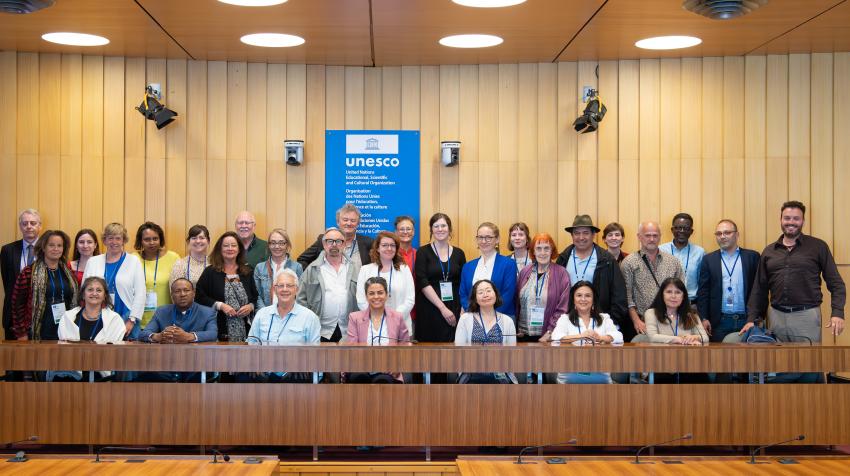Let us call her Magda. The name is invented, but the story is real. She was born in Lesotho 35 years ago. Her life exemplifies the burden of physical, sexual, and psychological violence against women.
Magda's grandmother, who had been adopted by poor rural workers, had migrated with them from the Orange Free State, which was at that time the heart of the apartheid ideology. Extreme poverty condemned her to return to South Africa to work while leaving her children behind with their grandparents. Magda's mother was only 15 when she gave birth to her daughter. Abandoned by a brutal husband, she followed her own mother's path and crossed the border in search of work. Magda was left to be raised by her grandmother and her uncle who, being the eldest man of the homestead, was considered the head of the family. She liked school but was often prevented from attending because of her domestic obligations, such as fetching wood or cleaning the house. Her uncle was often drunk and sexually abused Magda when she was seven. During the following eight years Magda had to regularly submit to forced sex. She soon understood that she would not receive any support from her grandmother, who, when she told what she was enduring, replied that she could not oppose her son's authority.
One day, Magda's mother reappeared and, discovering the situation, brought her to the province of Natal, where she had remarried and settled. But, implying that her daughter was the one trying to seduce men, she warned Magda that she would kill her if she ever had sexual relations with her new husband. It did not take long, however, for Magda's stepfather to start abusing her every time her mother was out. These were years of political unrest in the country as the apartheid regime was living its last moments. Magda's stepfather was involved in guerrilla activities, and the adolescent was afraid of him. Magda's mother, although seemingly aware of what was happening, never intervened. After three years, Magda finally escaped and fled to Johannesburg. She was eighteen.
In the city, her aunt initiated her into what is euphemistically referred to as "transactional sex". They went to a bar and Magda had to choose a man who would become her "boyfriend". In return for sex she would clandestinely spend the night with him in the dormitory of a hotel where he was employed as a cook. During the day she would work in the streets of the neighbourhood as a prostitute in search of clients who would give her some money to buy food. She lived this way for six months until she found a job as a maid in a Coloured family who exploited her in other ways. Some time later, Magda fell in love with a young man from the northern province, and they decided to settle in a shack in the township. However, their life together soon started to deteriorate. He often got drunk and they frequently had fights afterward. When they separated she was pregnant. Only a few months old, Magda's newborn daughter fell ill. The doctors diagnosed her with AIDS. Magda also tested positive for HIV. Her baby died before reaching one year of age.
Plunged into mourning, isolated and stigmatized, the young woman in turn became sick. By that time she was working for a non-governmental organization providing home-based care for HIV patients and had become a member of an AIDS activist network, the Treatment Action Campaign. Thanks to her association with these groups, she was included in a clinical trial for antiretroviral drugs not yet available on the public health care system. Magda's medical condition improved rapidly. She wanted to have a child and soon became pregnant. Born under the protocol for the prevention of mother-to-child transmission of HIV, her son was nicknamed Nevirapine (after the antiretroviral drug in this protocol). As a militant in the struggle against the epidemic, she was interviewed several times in the newspapers and on television, and thus became a heroine of the AIDS cause.
Magda's biography illustrates the intimate links between historical context and everyday experience, between macro-social facts and microsocial interactions, in the phenomenon of violence against women. In search of work, like most rural women of her time, Magda's mother left her in the hands of a weak grandmother and an incestuous uncle, thus reproducing her own mother's trajectory. The cycle of physical and sexual abuse, both among kin and with various partners, is repeated from one generation to the next. It is the result partly of individual agency ("bad" relatives or friends), but mostly of what Paul Farmer calls structural violence -- societal inequalities and State disengagement. Masculine domination and male violence are thus part of daily life, as are economic exploitation and racial segregation. In fact, the two series of phenomena are linked. The white political and social system exerts brutal material and spatial constraints on black families, disrupts kinship and marriage relations, deprives men of their usual prerogatives, and imposes working conditions on women. Under extreme conditions of life and without protection from the State, the relation between the social contract and the sexual contract, as Veena Das phrases it, is broken. Survival sex (the exchange of sexual relations for food and shelter) is the ultimate devaluation of not just a body, but a human life.
Certainly, Magda's case represents one extreme. However, it only exacerbates the potential violence that exists in all contexts characterized by a combination of neoliberal and repressive policies, for example, the political and domestic vulnerability of immigrant or refugee women in Western countries today. In both of these configurations, not only does the State indirectly permit the exercise of violence, but it also directly provokes it -- in the openness of the social world as well as in the intimacy of sexual relations. Understanding violence in these terms is clearly converse to considering it in terms of naturalization (violence is in human nature) or culturalization (violence is a part of African culture). The so-called "virgin cleansing myth", for example, is a rumor that continues to circulate in Southern Africa and beyond, according to which, men get purified of HIV/AIDS by raping young girls or even infants, believing that their victims' virginity can reverse their disease. The sexual abuse Magda experienced as a child and an adolescent not only occurred before the spread of the epidemic, but ultimately grimly reveals the ordinariness of male violence, the ambiguity and the complicity of family members -- including her own mother and grandmother -- and the broader historical and social perspective one has to consider to account for these tragic and common situations. Of course, consideration is not determination and one cannot say that this sort of violence is mechanically caused by historical and social facts: sexual abuse occurs in all segments of society, in South Africa and elsewhere. It is embedded in what Pierre Bourdieu analyzes, beyond context and class, as masculine domination.
Returning finally to Magda, it is remarkable that, unlike many other women under similar circumstances, she has been able not only to reconstruct her life after enduring a long sequence of violence, but also to invent for herself through her painful experience a political subjectivity devoted to a collective cause, which she henceforth embodies.
The UN Chronicle is not an official record. It is privileged to host senior United Nations officials as well as distinguished contributors from outside the United Nations system whose views are not necessarily those of the United Nations. Similarly, the boundaries and names shown, and the designations used, in maps or articles do not necessarily imply endorsement or acceptance by the United Nations.




